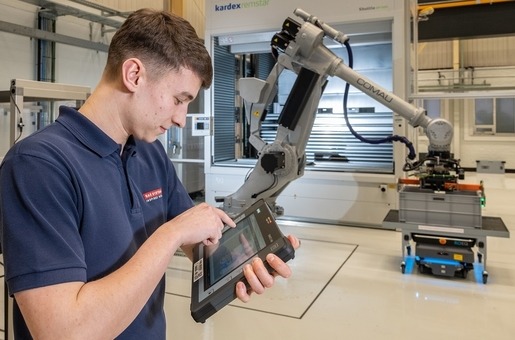FACTORY OF THE FUTURE OPTS FOR MOBILE ROBOTS FROM RARUK AUTOMATION
A new first-of-its-kind fully connected factory is applying game-changing technologies – including MiR Autonomous Mobile Robots (AMRs) supplied by RARUK Automation – to help advance the manufacture of the UK’s next-generation combat aircraft system, Tempest. Located at the Warton facility of BAE Systems, the ‘Factory of the Future’ has been designed in such a way that it can flex to manufacture different products within the same area, leveraging the advantages provided by the MiRs and intelligent systems to accommodate changes quickly.
Designed specifically to provide a connected intelligent factory for military aircraft technologies, the ‘Factory of the Future’ showcases manufacturing in a digital age. The facility serves as an experimental hub equipped with state-of-the-art technology to enable the brightest and boldest engineers to research, invest and test new technologies, build new capabilities and harness transformative ways of working.


“Notably, the ‘Factory of the Future’ demonstrates how BAE Systems remains competitive within the aerospace industry and addresses the challenges we are facing around cost/time reduction for future aircraft programmes,” explains Ismail Master, Manufacturing Development Engineer – Manufacturing Technology, at BAE Systems – Air.
Serving as the central logistics function within the new facility are a number of MiR autonomous mobile robots supplied by RARUK Automation.
“The MiRs enable a fully autonomous logistics solution for material flow within the facility,” explains Mr Master. “We are developing this capability and exploring how it integrates into existing and new production facilities. The robots will work collaboratively alongside operators, distributing material line-side to assembly stations on a just-in-time basis.”
The MiR robots are part of a wider logistics solution with a dedicated cell comprising a pick and place robot, vertical storage carousel and intelligent safety systems. 

“This cell is dedicated to storing and maintaining assets from goods delivery into the facility as and when they are required,” says Mr Master. “Full system integration facilitates the autonomous collection and distribution of assets to the wider factory and, conversely, doing the opposite in collecting and depositing assets back into the storage system. We are also assessing the capability to connect with other machines and systems as part of our vision to create a fully connected factory.”
BAE Systems’ selection of the MiR robots followed an in-depth trade study and technical analysis of available products.
“The purchase decision was based on the maturity of the product and its potential development/integration into our manufacturing environment,” states Mr Master. “We had a trial of a MiR100 in which we tested and analysed the system to understand the potential for the product to conduct intralogistics operations. RARUK Automation provided MiR training in terms of the robot, the fleet management system and the REST API it uses. We found the MiRs very user friendly and simple to program/update thanks to the embedding of all functions within the user interface.”
RARUK Automation has also provided BAE Systems with complementary products for the mobile robots that include the ROEQ top module, C300 cart and docking station. Together, these products enable a fully autonomous trolley docking/undocking process, removing elements of manual operator intervention. In addition, the ‘Factory of the Future’ uses a WISE I/O module for the MiRs so they can communicate directly with cell safety systems. As a result, the mobile robots can autonomously ingress/egress into and out of cells without tripping the safety system, again removing any need for operator involvement.
“The main advantage of the MiRs is that operators can focus on high-value tasks, instead of non-value activities like manually distributing assets to the build locations via trolleys,” says Mr Master.
Having the MiRs satisfy this requirement improves the efficiency of the manufacturing environment. In short, it is possible to schedule the delivery of assets so they arrive just-in-time, reducing space requirements for storing assets in working areas and enabling optimised inventory and improved asset management capabilities.
“The robots are very reliable in their operation for logistics activities, but we are seeking exceptionally high levels of accuracy and reliability in our ‘Factory of the Future’ operations,” explains Mr Master. “We are pushing the boundaries of mobile robot operation, which differs from typical usage and so we expect that a level of adjustment will be necessary. RARUK Automation responds quickly to our needs and provides the necessary technology training and knowledge to help address these challenges.”
Currently, the MiRs integrate with different cell systems to enable autonomous delivery directly from the working areas. However, the plan is to integrate the mobile robots to an overarching IOT platform for connectivity, data visualisation and mission orchestration.
“This will handshake directly with an MES to enable scheduling of asset delivery/collection based on the build operations,” concludes Mr Master. “A future goal is to link the MES to a dynamic scheduling capability that will enable advanced, flexible scheduling of material flow based on the current state of the environment, mitigating any process disruptions via real-time decision making.”




